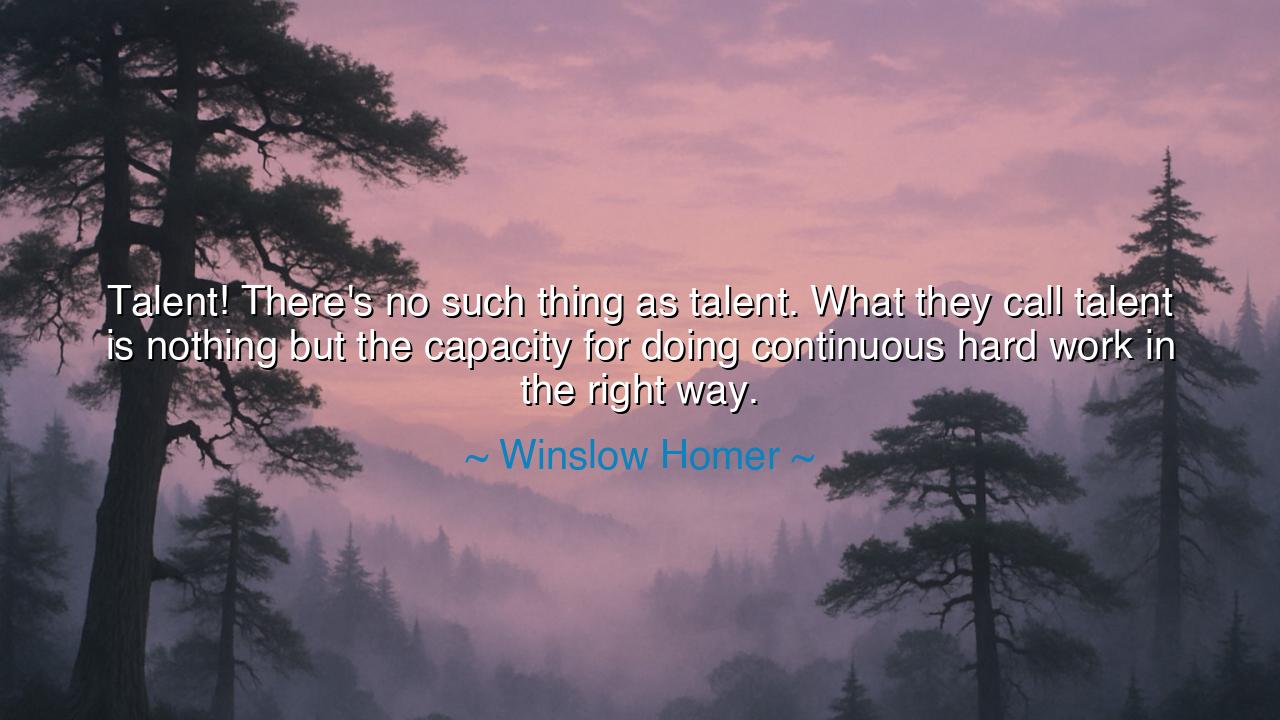
Talent! There's no such thing as talent. What they call talent
Talent! There's no such thing as talent. What they call talent is nothing but the capacity for doing continuous hard work in the right way.






When Winslow Homer declares, “Talent! There’s no such thing as talent. What they call talent is nothing but the capacity for doing continuous hard work in the right way,” he tears away the veil of illusion that men so often cling to. His words strike like a hammer against idleness, teaching that greatness is not some mysterious gift reserved for the few, but the fruit of tireless effort and unwavering discipline. Thus, he reveals the eternal law: excellence is earned, not bestowed.
The origin of this wisdom lies in Homer’s own life as a painter of enduring renown. Though many praised his genius, he himself knew the hidden truth — that behind every stroke of mastery lay years of trial, correction, and perseverance. By denying the myth of talent, he sought to free others from the chains of excuse, showing that what the world admires as natural brilliance is often the result of endless hard work done faithfully over time.
To speak of “the capacity for continuous hard work” is to honor the ancient virtue of persistence. The athlete, the craftsman, the poet, and the warrior all attain greatness not by divine accident, but by laboring with patience, enduring failure, and rising again. What is called talent is but the steady accumulation of strength, the sharpening of skill through repetition, and the courage to endure monotony for the sake of mastery.
His teaching stands as a rebuke to those who wait for inspiration or excuse their mediocrity by saying, “I was not born with the gift.” Homer reminds us that the true gift is within every soul: the will to strive, to practice, to endure. Those who embrace hard work become what others mistakenly call “talented,” while those who worship the illusion of innate genius remain idle dreamers.
Let the generations to come remember: the myth of talent is the refuge of the slothful. True greatness springs from labor sustained and directed with wisdom. Winslow Homer’s words endure as a torch, teaching that mastery belongs to those who persist, and that the path to glory is carved not by gifts of birth, but by the unrelenting hand of work.






PPhuc
Homer’s quote really makes me reflect on how often we use the word ‘talent’ as an excuse for not pushing ourselves. Is it easier to believe that someone is ‘talented’ rather than acknowledging the effort they put into their craft? If talent is just the ability to work hard, then how much of our own potential are we leaving untapped by relying too much on perceived limitations?
HYHoang Yen
I love Homer’s emphasis on hard work as the true essence of talent. It almost makes talent seem like a myth, suggesting that anyone can excel if they’re dedicated enough. But then, what about those who do achieve great things with what seems like less effort? Is there still value in recognizing ‘talent,’ or should we focus on hard work as the key to success in every field?
MKMinh Khuong
Homer's take on talent is a powerful reminder that success isn’t just about being born with something special. It's more about the mindset to continuously improve and refine one's skills. But what about those who seem to pick things up effortlessly—does this mean they’ve simply worked harder than others? Can this ‘no such thing as talent’ mindset inspire us to push through obstacles, or does it leave us feeling like there’s no room for natural flair?
HYHoai Y
Winslow Homer’s quote really challenges the idea of ‘talent’ as something innate. If talent is just the ability to work hard in the right way, then does that mean anyone can achieve greatness with enough perseverance? It makes me question how often we attribute success to natural ability rather than the countless hours of effort someone has invested. Can we redefine 'talent' as the ability to keep going, even when things get tough?